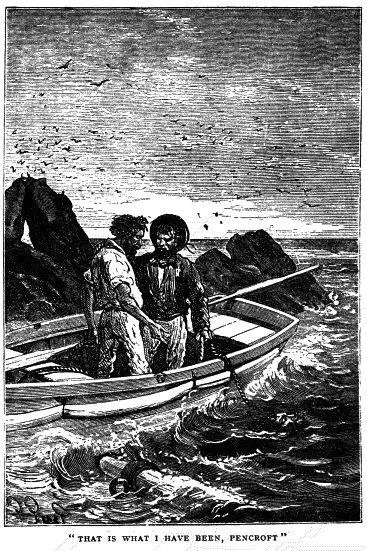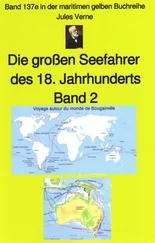“And can you guess, Pencroft,” asked the reporter, “how it happened, or what can have occasioned the explosion?”

“Oh! Mr Spilett, nothing is more simple,” answered Pencroft. “A convict vessel is not disciplined like a man-of-war! Convicts are not sailors. Of course the powder-magazine was open, and as they were firing incessantly, some careless or clumsy fellow just blew up the vessel!”
“Captain Harding,” said Herbert, “what astonishes me is that the explosion has not produced more effect. The report was not loud, and besides there are so few planks and timbers torn out. It seems as if the ship had rather foundered than blown up.”
“Does that astonish you, my boy?” asked the engineer.
“Yes, captain.”
“And it astonishes me also Herbert,” replied he, “but when we visit the hull of the brig, we shall no doubt find the explanation of the matter.”
“Why, captain,” said Pencroft, “you don’t suppose that the Speedy simply foundered like a ship which has struck on a rock?”
“Why not,” observed Neb, “if there are rocks in the channel?”
“Nonsense, Neb,” answered Pencroft, “you did not look at the right moment. An instant before she sank, the brig, as I saw perfectly well, rose on an enormous wave, and fell back on her larboard side. Now, if she had only struck, she would have sunk quietly and gone to the bottom like an honest vessel.”
“It was just because she was not an honest vessel!” returned Neb.
“Well, we shall soon see, Pencroft,” said the engineer.
“We shall soon see,” rejoined the sailor, “but I would wager my head there are no rocks in the channel. Look here, captain, to speak candidly, do you mean to say that there is anything marvellous in the occurrence?”
Cyrus Harding did not answer.
“At any rate,” said Gideon Spilett, “whether rock or explosion, you will agree, Pencroft, that it occurred just in the nick of time!”
“Yes! yes!” replied the sailor, “but that is not the question. I ask Captain Harding if he sees anything supernatural in all this.”
“I cannot say, Pencroft,” said the engineer. “That is all the answer I can make.”
A reply which did not satisfy Pencroft at all. He stuck to “an explosion,” and did not wish to give it up. He would never consent to admit that in that channel, with its fine sandy bed, just like the beach, which he had often crossed at low-water, there could be an unknown rock.
And besides, at the time the brig foundered, it was high-water, that is to say, there was enough water to carry the vessel clear over any rocks which would not be uncovered at low tide. Therefore, there could not have been a collision. Therefore, the vessel had not struck. Therefore, she had blown up.
And it must be confessed that the sailor’s arguments were not without reason.
Towards half-past one, the colonists embarked in the boat to visit the wreck. It was to be regretted that the brig’s two boats had not been saved; but one, as has been said, had gone to pieces at the mouth of the Mercy, and was absolutely useless; the other had disappeared when the brig went down, and had not again been seen, having doubtless been crushed.
The hull of the Speedy was just beginning to issue from the water. The brig was lying right over on her side, for her masts being broken, pressed down by the weight of the ballast displaced by the shock, the keel was visible along her whole length. She had been regularly turned over by the inexplicable but frightful submarine action, which had been at the same time manifested by an enormous water-spout.
The settlers rowed round the hull, and, in proportion as the tide went down, they could ascertain, if not the cause which had occasioned the catastrophe, at least the effect produced.
Towards the bows, on both sides of the keel, seven or eight feet from the beginning of the stem, the sides of the brig were frightfully torn. Over a length of at least twenty feet there opened two large leaks, which it would be impossible to stop up. Not only had the copper sheathing and the planks disappeared, reduced, no doubt, to powder, but also the ribs, the iron bolts, and tree-nails which united them. From the entire length of the hull to the stern the false keel had been separated with unaccountable violence, and the keel itself, torn from the carline in several places, was split in all its length.
“I’ve a notion!” exclaimed Pencroft, “that this vessel will be difficult to get afloat again.”
“It will be impossible,” said Ayrton.
“At any rate,” observed Gideon Spilett to the sailor, “the explosion, if there has been one, has produced singular effects! It has split the lower part of the hull, instead of blowing up the deck and topsides! These great rents appear rather to have been made by a rock than by the explosion of a powder-magazine.”
“There is not a rock in the channel!” answered the sailor. “I will admit anything you like, except the rock.”
“Let us try to penetrate into the interior of the brig,” said the engineer; “perhaps we shall then know what to think of the cause of her destruction.”
This was the best thing to be done, and it was agreed, besides, to take an inventory of all the treasures on board, and to arrange for their preservation.
Access to the interior of the brig was now easy. The tide was still going down, and the deck was practicable. The ballast, composed of heavy masses of iron, had broken through in several places. The noise of the sea could be heard as it rushed out at the holes in the hull.
Cyrus Harding and his companions, hatchets in hand, advanced along the shattered deck. Cases of all sorts encumbered it, and, as they had been but a very short time in the water, their contents were perhaps uninjured.
They then busied themselves in placing all this cargo in safety. The water would not return for several hours, and these hours must be employed in the most profitable way. Ayrton and Pencroft had, at the entrance made in the hull, discovered tackle, which would serve to hoist up the barrels and chests. The boat received them and transported them to the shore. They took the articles as they came, intending to sort them afterwards.
At any rate, the settlers saw at once, with extreme satisfaction, that the brig possessed a very varied cargo—an assortment of all sorts of articles, utensils, manufactured goods, and tools—such as the ships which make the great coasting-trade of Polynesia are usually laden with. It was probable that they would find a little of everything, and they agreed that it was exactly what was necessary for the colony of Lincoln Island.
However—and Cyrus Harding observed it in silent astonishment—not only, as has been said, had the hull of the brig enormously suffered from the shock, whatever it was, that had occasioned the catastrophe, but the interior arrangements had been destroyed, especially towards the bows. Partitions and staunchions were smashed, as if some tremendous shell had burst in the interior of the brig. The colonists could easily go fore and aft, after having removed the cases as they were extricated. They were not heavy bales, which would have been difficult to remove, but simple packages, of which the stowage, besides, was no longer recognisable.
The colonists then reached the stern of the brig—the part formerly surmounted by the poop. It was there that, following Ayrton’s directions, they must look for the powder-magazine. Cyrus Harding thought that it had not exploded; that it was possible some barrels might be saved, and that the powder, which is usually enclosed in metal coverings, might not have suffered from contact with the water.
Читать дальше













